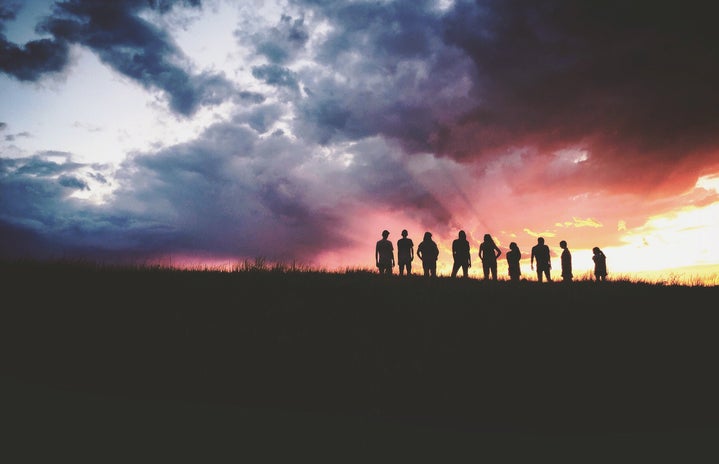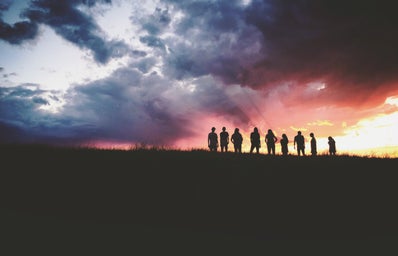Our firefighters, police officers, doctors and nurses all have to stay behind during hurricanes to tend to the daring minority who decide to stay behind. However, there is one group of people who also volunteer to get left behind during the storm. They sacrifice their lives just to keep us informed. They are the storm chasers. They are the journalists.
My father, Carl Pugliese, has officially been a storm chaser since 1998 when Hurricane George pummeled the Keys as a Category Two hurricane. However, when Hurricane Andrew, a Category Four to Five, hit Miami and the West Palm Beach area in 1992, he was told as a young editor to drive out during the storm and tell some stories. Ever since then, he has not stopped.
My father during Hurricane George.
We watch as our journalists get abused by the strong winds, dangerous rains and fearless flash floods. We watch as they are pummeled year after year, storm after storm. We watch as they risk their lives to get us the stories we all need to hear. To us, it is seemingly terrifying. To them, it is exhilarating.
“In the storm, there are so many things that can go wrong, and I am always thinking three steps ahead if those things were to go wrong,” Pugliese said. “I get a real rush out of that. When something breaks or fails I have a backup plan that I can fix quickly. There is that sense of rush.”
As a little girl, I had to know what a hurricane was at a very young age. After all, I was born in South Florida in 1999, right before some of the most active hurricane seasons Florida has ever known. This includes Frances, Jeanne, Charley, Wilma and perhaps the most infamous hurricane in recorded history, Katrina.
For those of you who do not recognize these names, consider yourself lucky. For those of you who do, perhaps you remember the terrors some of these storms caused. The storms don’t seem as terrifying now when we’re college students, but in 2004 and 2005, we were little children. Hurricanes scared us, and watching our parents tune into the news for updates scared us even more. Some had to experience evacuation, which is traumatizing in itself. Others could not leave and had to wait out the storm praying that their home would not be as battered as their nightmares played it out to be. For those of us who could not leave, it was often because our parents were doctors or nurses, firefighters or police officers. For me, it was because we did not want to leave my dad.
“We did not leave because dad [Pugliese] assured us that we would be safe,” said my mother, Joanne Biferie. “I always had confidence in his judgement as he was privy to information that the public did not have access to during the hurricane season. If he felt that we should stay, we stayed. I knew he would never put us in harm’s way.”
Watching the journalist get pummeled on TV was scary, but recognizing the journalist as your father was surprisingly comforting. Back in the early 2000s, cellular service was nowhere near what it is today. It was spotty and weak; Phones were not as advanced. We used to use radios to listen to the news when the power went out and the TV went black. Hearing my dad’s voice or seeing him on TV was my only way of knowing whether he was okay or, in some cases, alive. I used to grip the handheld radio when my dad’s voice echoed through it. It is a situation I would never wish upon anyone.
After he locked the hurricane shutters in place and stocked up our food and water supply, my dad would sit my little self down and talk about what was going to happen. He would explain in detail why he had to go and why it was important for my mom and I to stay safe and not join him. He would also explain why it was important for him to cover the story. I now fully know why he still does it nearly two decades later.
“I like the fact that I can say ‘I have an idea’ and then implement it,” my dad said. “It is the ability to come up with unique ways to deliver relevant stories. You learn from each story, and then you apply what you need based on that hurricane. During Florence, I had to evacuate a building. I never did that before. I had to adapt to a new comprehensive hurricane plan. We have one at our station, so I had to just adapt it to the North Carolina station. You can’t think of everything, but you have to go into these storms with a lot of thinking and prepping. There are no resources, so you have to know what you are doing out there. Trees just fall, active power lines on the floor and extreme flooding are some of the things you have to prepare for. The adrenaline you get from all this is the ‘high.’”
With storm journalism, the odds are typically against the journalists. During recent Hurricane Florence, the team had to evacuate their news station and adapt to their environment. No station typically means no news, which means no competition and bad ratings. Yet the team adapted and made the satellite truck their news station.
Knowing why did not make it hurt any less when he kissed me goodbye and shut the door each time. It did, however, make me a stronger person and appreciate his profession.
I appreciated it so much that now, nearly 13 years later, I want to follow in his footsteps as a journalist and possibly become a meteorologist, a decision that my journalist parents adore. My father is especially supportive, as he sees the amazing impact that storm journalism (and all journalism) can have on a community. Over his years of chasing storms, he has witnessed and told some amazing stories — stories that I want to one day be able to match.
My father in the satellite truck during recent Hurricane Florence in North Carolina.
“You never quite know what service you are providing until you get the ‘thank you’s and emails,” Pugliese stated. “People just want a calming voice to talk to when the winds get so dangerously loud. During some hurricanes, we created a phone bank at one point just to talk to these people.”
His stories take him outside the state of Florida, too. While I was visiting home a couple of weeks ago, my dad had to cut our time short to drive 12 straight hours to New Bern, North Carolina, where a storm left behind 10-foot-deep flooding and rows of damaged homes. While most people were leaving their city, my dad was hunkering down in their news station. The same station that a few days later, in the middle of the storm, received 10-foot storm surges and had to evacuate. However, news people cannot evacuate as there are too many stories to tell. Stories like the Waffle House story and WCTI story need to be told. Despite all the odds against him, he still had to adapt and overcome it.
Flooding near the WCTI station in New Bern, North Carolina, where Hurricane Florence hit.
“We had to evacuate the news station in New Bern,” my dad said. “The competitors are an hour away from New Bern, where the water was expected to rise. They got historical record flooding from the nearby Neuse River. The competition never lost power, as they were an hour west. Our station is a block from the river. While New Bern was getting pounded, we moved my satellite truck into downtown New Bern straight into the storm. We got up on satellite where we got a stronger signal than expected. We called corporate, and once we got approval, we started to send things out on Facebook Live. We were broadcasting on social media as a test to see whether we could send a television signal. Once we figured out that plan, we set up the satellite and started with one weather person and their anchor just talking about what we started to see. All of a sudden — my whole career keep in mind — I have always been in the right place at the right time. In New Bern, at our mobile news station, the Lieutenant Governor Dan Forest just showed up. So, what do you do? You just ask a bunch of questions. You have to fill up time on the air, and we had the Lieutenant Governor on air, while the other TV stations in the area were an hour away. At the end of the day, you still have to have to broadcast, even in a time of crisis.”
Channel 12 in North Carolina ran into Lt. Governor of North Carolina, Dan Forest. They had him address the people and give live updates.
Last year, my home was hit by Hurricane Irma. The eye never hit us, but we faced up to Category Two force gusts and Category One force winds. It was not the best situation, but it was better than some areas like the Keys. Just like the good ol’ days, my mom, aunt and I hunkered down in my house. But unlike the hurricane days in 2004 and 2005, my dad and I were in constant communication. He even offered to let me stay at the station and go out on the roads with him. I said no, as I did not want to leave my mom, but I realized the entire relationship had changed. His work no longer scared me like it had in years prior, but instead, it inspired me.
Journalists are the forgotten hurricane heroes. They put their lives in danger so the community can rest easy. Sometimes we, like natural disasters, abuse our journalists. We forget the grueling work that they do to get us the stories we need to hear. We often hear complaints of fake news, but there is no fake news in storm journalism. Nobody can fake the stories of people evacuating their homes, the stories of huge storm surges or the stories of the disasters in the cities affected by hurricanes. The stories that journalists tell are truthful, and it is our duty as human beings to respect their truthful and harrowing tales by giving them the utmost respect during our times of need.
Channel 12 of West Palm Beach, Florida and New Bern, North Carolina worked together for nearly a week to get the coverage the people needed during Hurricane Florence.
All photos courtesy of Carl Pugliese.


